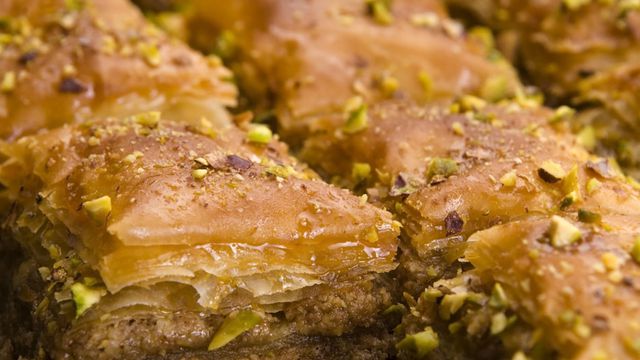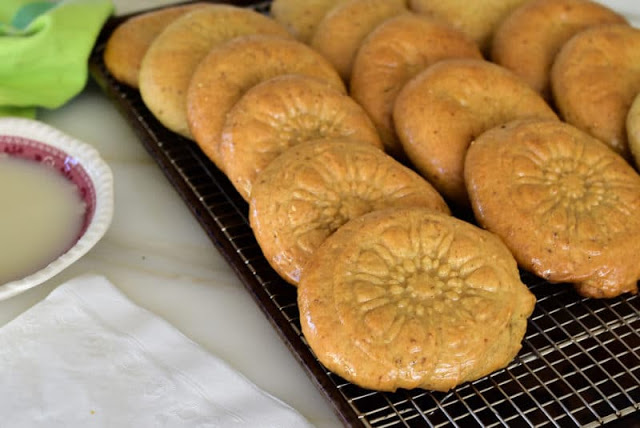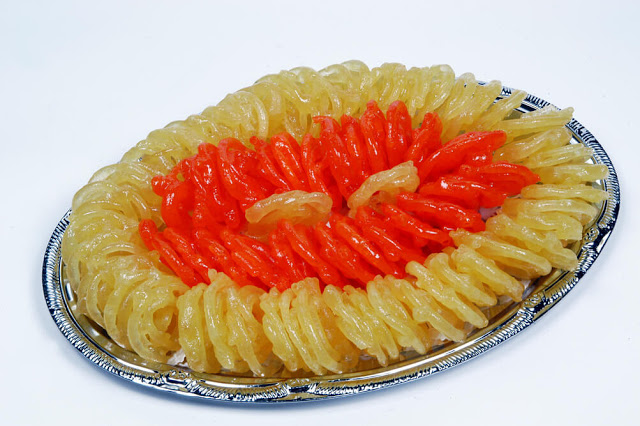Lebanese Dessert Recipes
Enjoy our selection of Authentic Lebanese Dessert Recipes. you will find a variety of delicious and popular desserts served in Lebanese restaurants and commonly used in every house in Lebanon and the surrounding countries in the middle east such as Syrian, Jordan, Arabian Gulf and even in Europe, Australia and the United stated were the Lebanese people are living. I am sure you will enjoy the practice of making some wonderful Lebanese dessert recipes. Ready, let's start.
1. Awamat
These sweet treats from Lebanon, called awamat, are perfect for any occasion. Small balls of dough are fried until golden brown and crispy, and then coated with simple syrup.
The name of these cookies, barazek, is the name of the most famous and popular cookie in Syria and Lebanon.
What are barazek? They are buttery, shortbread-like cookies covered with toasted sesame seeds on one side and studded with chopped pistachios on the other side.
Whenever someone in Beirut makes a short trip to Damascus, bringing a few boxes of these barazek is usually commissioned from the person travelling. Damascus is reputed for making the best barazek in the region.
An ideal and good end to a delicious meal is a creative dessert such as Baklawa (Baklava).
Ghraybeh (Flour Cookie), these delicate cookies melt in your mouth. The incredible blend of ingredients ensures the freshness and taste. Ghraybeh is incredibly easy to make. It consists of only a few ingredients. Once you try them you will fall in love! Ghraybeh is available in Arabian dessert restaurants.
This kaak recipe is kneaded by hand you can however make it is a mixer without having to ‘activate’ the yeast. Simply rub the yeast into the flour using your fingers, just as if you were making a crumble and mix as instructed.
If you’re familiar with Arabic and Lebanese sweets, you would know that “Ashta” is a major ingredient and is considered as the king of fillers. Ashta is a slang word for “Kashta” in classical Arabic, which refers to clotted cream prepared with rose water and orange blossom water. Ashta is used as a filler in desserts such as Knefeh (kunafa), Znood el Sit, Atayif (Katayif) and in many others. It is also served on top of fruit cocktails.
Atayef is a kind of sweet very popular in Ramadan, the dough could be filled either of cheese or with Ashta (kind of Arabic cream). This sweet requires quite some time to prepare but it is worth it.
Mamool, Mamoul or Maamoul means filled in Arabic. These are very popular in Lebanon but can be found throughout the Middle East and North Africa. They are traditionally shaped as crescents or as pressed cookies and have several variations for the fillings. This one has a walnut filling, but you can use almonds or pistachios too.
Maamoul is an ancient Arab dessert filled pastry or cookie made with dates, pistachios or nuts such as walnuts (occasionally almonds). They may be in the shape of balls, domed or flattened cookies. They can either be decorated by hand or be made in special wooden molds.
Mafroukeh is great combination between semolina and sugar with a special presentation with all ground nuts. Here is a Lebanese dessert, easy, quick to prepare, and excellent for a crowd.
Meghli is an authentic Lebanese dish. Meghli is served on special occasions, such as the birth of a child.
14. Muhallabieh
This Middle Eastern pudding (Muhallabieh) is a favorite both in summer and winter, especially liked by children. In the Middle East the rice may be purchased already pulverized. It could also be pulverized at home with a mortar and pestle or in an electric blender.
Delicious and Easy to Prepare Lebanese Rice Pudding Dessert.
A soft plastic bottle with a small hole in the tip is used. A ketchup or mustard bottle may be used. Syrup may be divided into 2 or 3 parts and desired food coloring may be added to each.
This semolina and yoghurt slice is one of the simplest desserts you can make for a dinner party. Its fragrance is derived from an aromatic sugar syrup (atter), made with rosewater and orange blossom water. This recipe also uses mahlab, a powerful spice with notes of bitter almond and cherry to add extra dimension.
Osmalieh is a traditional Lebanese dessert prepared with baked vermicelli ( Kunafa pastry) sandwiched between sweet cream and topped with Arabic candy floss or fairy.
19. Sahlab
Sahlab is a body-warming, sugary pudding, and one of the most famous desserts in the Arab world and Turkey. It is a traditional winter dessert that dates back to the Ottoman Empire, when Levantine Arabs lived under Turkish rule.
Lebanese sfouf cake is a very simple, oil-based yellow cake, given its technicolor with turmeric–sfouf is beloved by the Lebanese, to enjoy with coffee or tea (not, at least according this dessert-eater, for dessert…). Sfouf cake includes a short list of ingredients and is egg-free.
You can adjust the flavorings some if you need to; i.e., leave out the anise if that’s not a crowd-pleaser there. Sfouf will keep for a good week in an airtight container.




























I am looking forward this ! :)
ReplyDelete